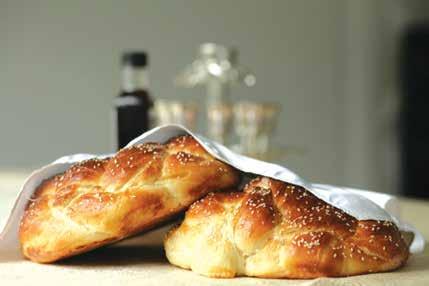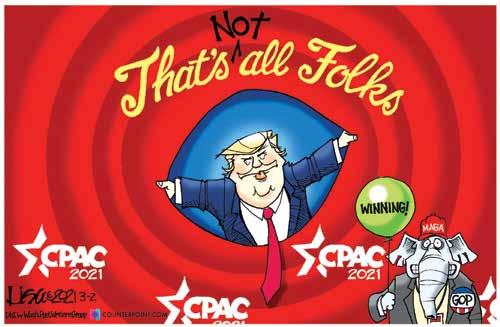
7 minute read
Delving into the Daf
A Challah Covering Quiz
By Rabbi Avrohom Sebrow
The Daf this week touched on the practice of covering the challah before the Shabbos meal (Pesachim 100a-b). Three reasons are offered for this practice. Tosfos cites two of them.
The first is from Rav Achai Gaon. He said it should be clear that the challos are specifically for Shabbos. This is a way of honoring Shabbos. We cover the challos to demonstrate that the challos were not for a weekday meal. When we say “Boruch… Mekadeish HaShabbos” before uncovering the challah it is clear that the meal is for Shabbos.
The second reason cited by Tosfos is that a double portion of manna fell on Friday. No manna fell from the sky on Shabbos or yom tov. Therefore, we commemorate the manna that was absent on Shabbos or yom tov by using two challos to represent the double portion of manna. Hashem protected the manna with a layer of dew below it and above it. Therefore, the covering on the challah represents this layer of dew.
The third reason cited by the Rishonim for covering the challah is to protect it from shame. In general, the bracha recited on the challah should precede the bracha recited over wine. During the week, Hamotzi is recited before Hagefen. On Shabbos, when kiddush must be recited first, we are forced to reverse the order and recite Hagefen first. To somewhat rectify this “wrong,” we cover the challah, leaving the wine the only food in front of us.
Each of these reasons can cause different results depending on the situation. To test your understanding, please take this quiz. The answer to every question is any combination of A, B, or C or perhaps a solitary letter.
A represents Rav Achai Gaon’s answer of kavod Shabbos.
B represents double portion of manna.
C represents protecting the challah from shame. 1. Which explanations mandate that you cover the challah by the Friday night meal?
That was easy.
The answers are A, B, and C. 2. Which explanations mandate that you cover the challah by the Shabbos day meal?
The Mordechai says that the only reason one would think a meal was not for Shabbos is if it comes right after a weekday, in this case, Friday or erev yom tov. It is clear that the Shabbos day meal is for Shabbos. Therefore, A does not apply according to the Mordechai and the answer is B and C. 3. Which explanations mandate that you cover the challah by the third meal of Shabbos?
There is no kiddush with the Hagefen bracha to shame the challah, therefore C doesn’t apply. A doesn’t apply; see answer #2. Therefore, only B applies.
The Aruch HaShulchan did not cover the lechem mishna by the third meal. The Kaf HaChaim says one should. My Rebbe, HaGaon HaRav Henoch Leibowitz, zt”l, would cover the lechem mishna by the third meal. 4. May one use a clear plastic challah cover according to all the explanations?
Certainly, according to A and B one may use a clear plastic cover. However, perhaps one could suggest that a clear plastic cover doesn’t save the challah from shame. It is still visible and doesn’t hide the challah, while leaving only wine in front of us. Rav Nissim Karelitz, zt”l, agrees and rules that, according to the third explanation, one may not use a clear plastic challah cover. Rav Shlomo Zalman, zt”l, disagrees. 5. May one just keep the challah uncovered and place it on the table after kiddush?
According to A and C, one may. It is clear the challah is for Shabbos because it is being placed on the table after kiddush. Likewise, there is no shame for the challah because at the time of HaGefen it isn’t present. However, one loses out on the symbolism of the double covering of dew. 6. May one remove the covering off the challah right after the eracha of Hagefen, before one recites the second bracha?
According to A and B, no. However, there is no shame after Hagefen is recited. So, C wouldn’t apply. (Pri Megadim.) 7. May one remove the covering off the challos after the full kiddush?
Certainly, according to C, one may. See answer #6. According to answer A, one may do so as well. Once a person recited Mekadesh HaShabbos, when one uncovers the challah, it is clear it is for Shabbos. Whether B applies is a machlokes Acharonim. They debate if we need to symbolize the double covering of manna even during the recital of Hamotzi. 8. According to any explanation is there a reason to attempt to keep the challah covered even while slicing it?
There is a chassidishe custom that extends B as far as possible. 9. If one would like to recite Havdala and eat bread for Melave Malka immediately after, is there any reason to cover the challah?
Yes. Reason C may still apply. One is reciting Hagefen before Hamotzi. 10. At a large Friday night meal, one person is reciting kiddush for everyone. However, everyone has their own challah roll in front of them. Do they have to cover their challah rolls?
According to A, yes. They must demonstrate that their meal is in honor of Shabbos. B applies as well since they will be using their own
rolls for lechem mishna; they should cover their rolls to symbolize the double layer of dew.
C is a machlokes between Rav Shlomo Zalman and Rav Moshe. Rav Shlomo Zalman says that since the listener is not reciting his own Hagefen there is no shame to his challah. Rav Moshe disagrees and reasons that since the person is listening to kiddush, it is as if he is reciting it and there is shame to the challah. 11. At a kiddush on Shabbos day, where one is only eating cake and not challah, does he have to cover the cake in front of him while he recites kiddush?
A doesn’t apply on Shabbos day. B doesn’t apply since the cake is not lechem mishneh; there is no reason to symbolize the dew. Whether one has to cover cake or not because of reason C is a machlokes. The Eshel Avrohom says no. The Levush Mordechai says yes. 12. If one is reciting kiddush on challah instead of wine, does he have to cover the challah?
According to B, yes. According to C, no. There is no embarrassment since it is first! See the MB 271:41 for the proper procedure in this scenario. 13. Is there any reason to cover of Shabbos, and the food should be served after kiddush. The Rashbam on 100a uses the term “food” instead of “bread,” possibly indicating that all the food should be covered during kiddush or not brought out before kiddush.
any other food on the Shabbos table Friday night?
According to B and C, no. However, according to A, it would seem that the answer may be yes. Rav Soloveichik once attended a communal Friday night meal and asked that all the serving dishes be returned to the kitchen before kiddush. The meal should be served in the honor
14. The Elya Rabba recommends that one use a white challah cover. Which explanation does that fit with?
B. White most closely symbolizes a dew covering. They didn’t have clear plastic back then! 15. If one was eating a Friday afternoon bread meal and it became time for Shabbos, one stops the meal and recites kiddush. (This procedure is somewhat complicated.) Does one have to cover the challah?
According to A and B yes but not according to the C. One is not reciting Hamotzi, therefore there is no embarrassment to the challah that it is coming in second place.
How did you score?
Every answer that is a machlokes can be scored correct if you answered yes or no for that letter. If you got an 85 or above using whatever grading method you feel appropriate, email the author to be entered into a raffle for six gourmet chocolate bombs.
Rabbi Avrohom Sebrow is a rebbe at Yeshiva Ateres Shimon in Far Rockaway. In addition, Rabbi Sebrow leads a daf yomi chaburah at Eitz Chayim of Dogwood Park in West Hempstead, NY. He can be contacted at ASebrow@gmail.com.












